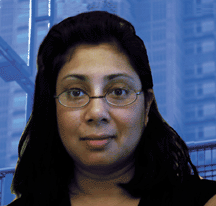How Does The Forex Market Work?
Raghee Horner
by Jayanthi Gopalakrishnan
Raghee Horner is a trader, teacher, and author, with more than 15 years' experience in the markets. She is a highly sought-after educator and has taught her brand of technical analysis and charting strategies all over the world, conducting seminars throughout the US, Canada, the Caribbean, and Asia. The author of the works Forex Trading For Maximum Profit and the upcoming Thirty Days Of Trading, she has taught foreign exchange, futures, and equities trading for more than a decade. Emphasizing charting and price action, Horner teaches the tools and strategies that encourage self-directed traders to pursue the study of chart analysis and market psychology. Not only that, she has offered education and analysis on her own radio program and currently produces a daily multimedia commentary for TradeDirectFX.com. She also offers analysis about the forex market for eSignal and is a frequent speaker at the Forex Trader Expo.STOCKS & COMMODITIES Editor Jayanthi Gopalakrishnan interviewed Horner via telephone on February 7, 2006.

The market you trade should be secondary to the fact that you have a methodology.
Raghee, how did you get into forex trading?
Like a lot of traders, I first got interested because I was already trading other markets, and - also like a lot of other traders - I was on the lookout for new trading opportunities. I just don't think of myself as "just" a foreign exchange trader; I trade futures, and on occasion, I'll trade stocks. I actually got my start trading commodity futures, so I was exposed to currency trading via currency futures. So it really felt like a natural move to include the forex market to my trading approach and portfolio. More traders should think of themselves as traders. The market you trade should be secondary to the fact that you have a methodology.
Were you working with a firm?
No, I've never worked with a firm or managed other people's money. I've always been a private trader.
When did you start?
That's its own funny story, actually! When I was a kid, my mom was very much a typical Indian mother: school, school, school, homework, homework, homework. But I wanted an after-school job. She said, "Well, if you're going to get a job, you have to give me 25% of what you make, and I'll invest it for you." Of course, being a typical teenager, I was upset at that, but I found out that my mom was putting my money in stocks and mutual funds. So I thought, "You know, if that's where my money is going, I'd better see what this is all about." So at 16 or 17, I took some of my father's old engineering draft paper and began to plot the closes, not really understanding this was my first foray into charting. That's how I got started.
I have to give my mom credit: she got me into it whether I liked it or not! And my interest grew from there.
From your experience, what are some important issues that anyone who wants to venture into forex should consider?
That's a good question, because too many people think there is some new way that they should approach the forex market. Again, it's my experience that the general public migrating over to forex have already had exposure to the stock market, and even, to a lesser degree, the futures market. I always tell them it's similar to what they're already doing. They're already accustomed to news events and reports, to charts and price action.
I think forex traders have to become "big picture" people. The moves in the forex market are affected by the currencies, underlying equities markets, the news and events of that country... and again, by the same factors for the other half of the pair.
For example, if you and I were trading the euro/US dollar pair, I'd tell you to really focus on the word "pair." Consider you're really thinking abut two currencies, two equities, two equities markets. During the European sessions, the euro/Usd is trading for about five to six hours without any US market participation. That's one dynamic there. And then about 7 am or 8 am Eastern time, we see the UK markets begin to overlap with the US markets that are just opening. That's another dynamic. After 8 am, we're in a great market overlap. We have the US markets opening and the afternoon session in the UK. I have to emphasize the London market, because if New York is the center of the stock universe, then London is the most active trading center of the forex universe, followed by the US.
So to answer your question, if I had to pick one major aspect to specifically
consider in forex, it would be time. Being keenly aware of Sydney, Tokyo,
Hong Kong, London, Singapore, and New York, and all of their trading times,
is the key component to any forex trading approach. In fact, I'll tell
my students, "Before you get into a trade, ask yourself, 'Who's awake?'
before you push that buy or sell button." If nobody's awake, there's no
participation. To me, global time is the aspect that stocks and futures
traders may not think about.
...Continued in the April 2006 issue of Technical Analysis of STOCKS & COMMODITIES
Excerpted from an article originally published in the April 2006 issue of Technical Analysis of STOCKS & COMMODITIES magazine. All rights reserved. © Copyright 2006, Technical Analysis, Inc.
Return to April 2006 Contents